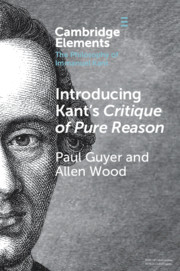Element contents
Introducing Kant's Critique of Pure Reason
Published online by Cambridge University Press: 24 March 2021
Summary
- Type
- Element
- Information
- Online ISBN: 9781108894869Publisher: Cambridge University PressPrint publication: 22 April 2021
Bibliography
Primary Sources
Secondary Sources
- 9
- Cited by



